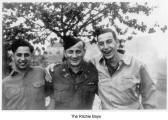
The Ritchie Boys
by Lucille de Saint-Andre
THE RITCHIE BOYS was the opening selection of more than 100 non-fiction films from Canada and around the world at the 11th Hot Docs Canadian International Documentary Festival between April 23 and May 2. Toronto’s answer to documentaries, this festival has mushroomed in audience attendance, and presence of enthusiastic local and international filmmakers, buyers, distributors and broadcasters who celebrate films in screenings, workshops and happy and noisy parties.
The Ritchie Boys shows how human beings can change from potential victims to victors, its director, veteran filmmaker Christian Bauer (Missing Allen) told a packed theatre during its world premiere, "I love being in Toronto, its audiences are the best in the world," adding he was fortunate to get part of the funding for his 400,000 Euros budget at last year’s fest.
He introduced two of the docus’ heroes, Guy Stern and Fred Howard, who regaled the audience with their incredible personal experiences during World War II.
The film shows a band of German Jewish intellectuals, refugees from Hitler’s Germany, who fled to the U.S., being trained for intelligence work (interrogating POW’s) at deeply secret US Camp Ritchie in Maryland. It’s the winter of 1942-43 and the Allies are preparing for the D-Day invasion. The army wanted to form an elite intelligence unit, whose members were volunteering to return to Europe, to pioneer the first modern psychological warfare and break the German army’s morale.
In never-seen archival footage, whose quality and colour are dazzling, obtained from The Library of Congress, the US National Archives and private collections, the film tells of the adventures and success, the courage and heroism of an unlikely band of individuals brought together by their will to fight Hitler and his Nazis.
There are some emotional moments as Ritchie Boys describe the destruction in their home towns or their encounter with concentration camp prisoners. There are also some humorous incidents too: a Ritchie Boy who joined his unit (paratroopers) at the last minute learns that the new man who has never jumped before must go first. Another tells of worries about the dog-tags that showed "religious preference" with a letter J. This benevolent US army custom recalled, no doubt, the Nazi practice of stamping a large "J" on passports.
 Bauer,
who lives near Munich, said he was always interested in stories of refugees
and was inspired by the tale of the Ritchie boys. In a telephone interview
he said "I was very happy to make this film and glad to share it with an
audience." The film was shown three times during Hot Docs and each showing
was sold out.
Bauer,
who lives near Munich, said he was always interested in stories of refugees
and was inspired by the tale of the Ritchie boys. In a telephone interview
he said "I was very happy to make this film and glad to share it with an
audience." The film was shown three times during Hot Docs and each showing
was sold out.
There is a possibility of theatrical release, the director said, and it will be shown later on History TV and Discovery channels. The timing depends on a possible Academy nomination for the Oscars.
His next project will be a sequel to "Missing Allen," the film Bauer made about the murder of his friend and cameraman. .
Are some of the Ritchie boys still alive? "Well, 10,000 people went through this camp, so it’s hard to keep track of them all, they’re now octogenarians, but quite a few are still alive, and quite lucid" Bauer said. Many have become successful academicians, and businessmen. Guy Stern and Fred Howard are retired and working for political and humanitarian causes. Both were against the Iraq war and do not approve of the present U.S. administration’s mind set.

